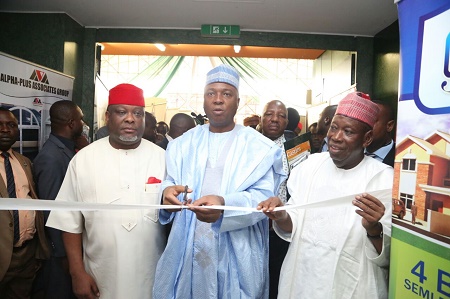Let me also commend all the stakeholders from the Housing, Construction and Development Sector that have congregated here today – the executives of housing corporations; technical representatives from educational and research institutions; financiers from primary mortgage banks; the media; and all other concerned participants.
Before I begin, I would like to convey the Greetings and Goodwill of the 8th National Assembly and the Senate of the Federal Republic of Nigeria to this convention.
The Abuja Housing Show is another enlightening and enterprising example that showcases the importance of property ownership in the developmental cycle.
As articles 2 and 17 of the United Nation’s Universal Declaration of Human Rights classifies “the right to property” and “the right to own property” as fundamental human rights to all people – as the government of the day, it is important that we work towards the attainment of access to affordable housing for all Nigerians.
In view of the fact that the ownership of land and housing is often determined by social and economic factors, at the 8th Senate, we are working to level the playing field for all citizens by implementing the recommendations of the National Assembly Business Environment Roundtable (NASSBER), that highlights numerous clauses and provisions in a handful of bills that affect property rights, access to land, multiple taxation, and access to credit to facilitate the purchase of landed property.
On the social end, through the Gender and Equal Opportunity Bill which was re-introduced and has passed first reading in the Senate, we are addressing Nigeria’s traditional inheritance laws to pave the way for more women to be able to acquire property.
Additionally, just last week the Discrimination Against Persons With Disabilities (Prohibition) Bill passed its 3rd and Final Reading at the Senate. With this Bill in place, there will be better regulation of our building codes that will enable the access to more infrastructure of Nigerians with disabilities.
Ladies and Gentlemen, the aforementioned are some of the key areas that we have touched on for the Housing Sector over the past year. However, we acknowledge that with the input of the stakeholders here present, we can accomplish a lot more by coming up with more detailed and multi-faceted framework that addresses the loopholes that exist in the sector.
With an estimated housing deficit of 17 million units, it is important that the National Assembly; the Executive – through the Ministry of Power, Works and Housing; and
those that operate at the business end in the housing sector — the architects, engineers, construction companies, and developers, work in sync to develop a policy and legislative blueprint that will help Nigeria to tackle the looming housing crisis.
In order to ensure the standards of buildings being developed for the citizenry, I will be asking the Senate Committee on Lands and Housing to work on strengthening their oversight of the agencies of government that are tasked with making sure that building codes are adhered to.
As we do all of this, we must all remember that due to the decimation that has occurred in the North East, and the under-development of pockets of the Niger Delta, many of our citizens still do not have access to clean and safe shelter. In this regard, I challenge everyone here to work in collaboration with the Senate, the National Assembly as a whole, and the Federal Government to come up with effective and innovative solutions of addressing these two key issues.
From the displays that I have seen today, I have no doubt in my mind that we are on the right track in
securing the issue of Shelter in not only Abuja, but in Nigeria as a whole. I even expect that we can impact the entire West African region in the provision of quality, safe, environmentally friendly, affordable housing solutions for all.
Working together, we can truly build a Nigeria that our children and we can be proud of.
God bless you all. God bless the Federal Republic of Nigeria.
















